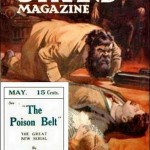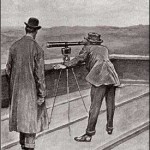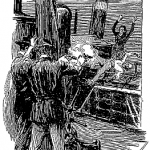In one respect Tom Dimsdale was immeasurably the gainer by his connection with the firm, for without that it is difficult to say how he could have found opportunities for breaking through the barrier which separated him from Kate. The surveillance of the merchant had become stricter of late, and all invitations from Mrs. Dimsdale or other friends who pitied the loneliness of the girl were repulsed by Girdlestone with the curt intimation that his ward’s health was not such as to justify him in allowing her to incur any risk of catching a chill. She was practically a prisoner in the great stone cage in Eccleston Square, and even on her walks a warder in the shape of a footman was, as we have seen, told off to guard her. Whatever John Girdlestone’s reasons may have been, he had evidently come to the conclusion that it was of the highest importance that she should be kept secluded.
As it was, Tom, thanks to his position as one of the firm, was able occasionally, in spite of every precaution to penetrate through the old man’s defensive works. If a question of importance arose at Fenchurch Street during the absence of the senior partner, what more natural than that Mr. Dimsdale should volunteer to walk round to Eccleston Square in order to acquaint him with the fact. And if it happened that the gentleman was not to be found there, how very natural that the young man should wait half an hour for him, and that Miss Harston should take the opportunity of a chat with an old friend? Precious, precious interviews those, the more so for their rarity. They brightened the dull routine of Kate’s weary life and sent Tom back to the office full of spirit and hope. The days were at hand when the memory of them was to shine out like little rifts of light in the dark cloud of existence.
And now the time was coming when it was to be decided whether, by a last bold stroke, the credit of the House of Girdlestone was to be saved, or whether the attempt was to plunge them into deeper and more hopeless ruin. An unscrupulous agent named Langworthy had, as already indicated, been despatched to Russia well primed with instructions as to what to do and how to do it. He had been in the employ of an English corn merchant at Odessa, and had some knowledge of the Russian language which would be invaluable to him in his undertaking. In the character of an English gentleman of scientific tastes he was to establish himself in some convenient village among the Ural Mountains. There he was to remain some little time, so as to arouse confidence in the people before making his pretended discovery. He was then to carry his rough diamonds to Tobolsk, as the nearest large town, and to exhibit them there, backing up his assertion by the evidence of villagers who had seen him dig them up. The Girdlestones knew that that alone would be sufficient when telegraphed to England to produce a panic in the sensitive diamond market. Before any systematic inquiry could be made, Langworthy would have disappeared, and their little speculation would have come off. After that the sooner the people realized that it was a hoax the better for the conspirators. In any case, there seemed to be no possibility that the origin of the rumour could be traced. Meanwhile, Ezra Girdlestone had secured his passage in the Cape mail steamer Cyprian. On the night that he left he sat up late in the library at Eccleston Square talking over the matter for the last time with his father.
The old man was pale and nervous. The one weak point in his character was his affection for his son, an affection which he strove to hide under an austere manner, but which was none the less genuine. He had never before parted with him for any length of time, and he felt the wrench keenly. As to Ezra, he was flushed and excited at the thought of the new scenes which lay before him and the daring speculation in which he was about to embark. He flung himself into a chair and stretched his thick, muscular limbs out in front of him.
“I know as much about stones,” he said exultantly, “as any man in London. I was pricing a bag of rough ones at Van Helmer’s to-day, and he is reckoned a good judge. He said that no expert could have done it better. Lord bless you! pure or splints, or cracked, or off colour, or spotted, or twin stones, I’m up to them all. I wasn’t a pound out in the market value of any one of them.”
“You deserve great credit for your quickness and perseverance,” replied his father. “Your knowledge will be invaluable to you when you are at the fields. Be careful of yourself when you are there, my son, if only for my sake. There are rough fellows at such places, and you must give them soft words. I know that your temper is quick, but remember those wise words, ‘He that ruleth his spirit is better than he that taketh a city.'”
“Never fear for me, dad,” said Ezra, with a sinister smile, pointing to a small leather case which lay among his things. “That’s the best six-shooter I could get for money. I’ve taken a tip, you see, from our good friend, the major, and have six answers for any one that wants to argue with me. If I had had that the other day he wouldn’t have bounced me so easily.”
“Nay, but Ezra, Ezra,” his father said, in great agitation, “you will promise to be careful and to avoid quarrels and bloodshed. It is against the great law, the new commandment.”
“I won’t get into any rows if I can help it,” his son answered.
“That’s not my game.”
“But if you think that there is no mistake, if your opponent is undoubtedly about to proceed to extremities, shoot him down at once, my dear lad, before he has time to draw. I have heard those who have been out there say that in such cases everything depends upon getting the first shot. I am anxious about you, and shall not be easy until I see you again.”
“Blessed if he hasn’t tears in his eyes!” Ezra exclaimed to himself, much astonished at this unprecedented occurrence.
“When do you go?” his father asked.
“My train leaves in an hour or so. I reach the steamer at Southampton about three in the morning, and she starts with the full tide at six.”




